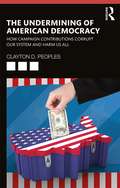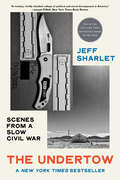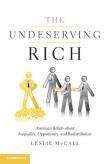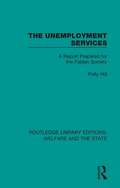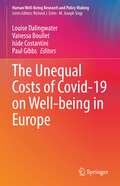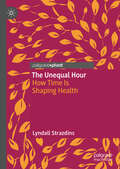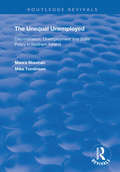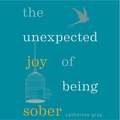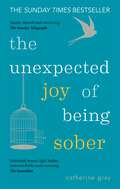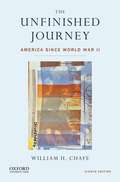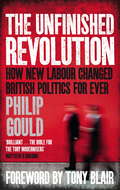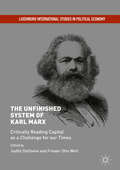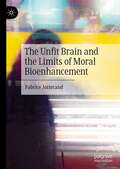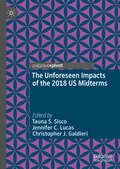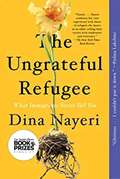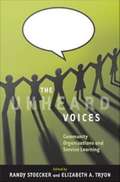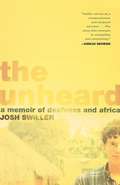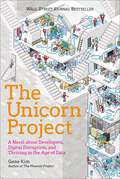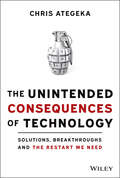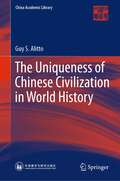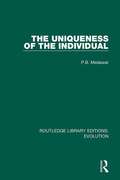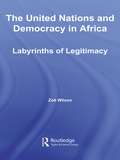- Table View
- List View
The Undermining of American Democracy: How Campaign Contributions Corrupt our System and Harm Us All
by Clayton D. PeoplesThe public believes that politicians in the US favor special interests over their constituents and that our political institutions have become corrupt—and they are right. A growing body of evidence shows that special interests have disproportionate sway over policy via campaign contributions and lobbying. In this book, the author presents this evidence in a logical, understandable way; he then illustrates how campaign contributions harm our economy, exacerbate inequality, and undermine our democracy. One of the most startling findings of the book is that campaign contributions led to the Financial Crisis and Great Recession. The author concludes that campaign contributions have effectively created an oligarchy in the US, and, thus, reform is needed to save our democracy. The final chapter of the book suggests a number of different reforms that could be pursued—and highlights some ways in which these reforms can be achieved.
The Undertow: Scenes From A Slow Civil War
by Jeff SharletAn Instant New York Times Bestseller. A National Book Critics Circle Finalist for Nonfiction One of the New York Times 100 Notable Books of 2023 One of The New Republic's Best Books of 2023 “A riveting, vividly detailed collage of political and moral derangement in America.” —Joseph O’Neill, New York Times Book Review One of America’s finest reporters and essayists explores the powerful currents beneath the roiled waters of a nation coming apart. An unmatched guide to the religious dimensions of American politics, Jeff Sharlet journeys into corners of our national psyche where others fear to tread. The Undertow is both inquiry and meditation, an attempt to understand how, over the last decade, reaction has morphed into delusion, social division into distrust, distrust into paranoia, and hatred into fantasies—sometimes realities—of violence. Across the country, men “of God” glorify materialism, a gluttony of the soul, while citing Scripture and preparing for civil war—a firestorm they long for as an absolution and exaltation. Lies, greed, and glorification of war boom through microphones at hipster megachurches that once upon a time might have preached peace and understanding. Political rallies are as aflame with need and giddy expectation as religious revivals. At a conference for incels, lonely single men come together to rage against women. On the Far Right, everything is heightened—love into adulation, fear into vengeance, anger into white-hot rage. Here, in the undertow, our forty-fifth president, a vessel of conspiratorial fears and fantasies, continues to rise to sainthood, and the insurrectionist Ashli Babbitt, killed on January 6 at the Capitol, is beatified as a martyr of white womanhood. Framing this dangerous vision, Sharlet remembers and celebrates the courage of those who sing a different song of community, and of an America long dreamt of and yet to be fully born, dedicated to justice and freedom for all. Exploring a geography of grief and uncertainty in the midst of plague and rising fascism, The Undertow is a necessary reckoning with our precarious present that brings to light a decade of American failures as well as a vision for American possibility.
The Undeserving Rich: American Beliefs about Inequality, Opportunity, and Redistribution
by Leslie MccallIt is widely assumed that Americans care little about income inequality, believe opportunities abound, admire the rich, and dislike redistributive policies. Leslie McCall contends that such assumptions are based on both incomplete survey data and economic conditions of the past and not present. In fact, Americans have desired less inequality for decades, and McCall's book explains why. Americans become most concerned about inequality in times of inequitable growth, when they view the rich as prospering while opportunities for good jobs, fair pay and high quality education are restricted for everyone else. As a result, they favor policies to expand opportunity and redistribute earnings in the workplace, reducing inequality in the market rather than redistributing income after the fact with tax and spending policies. This book resolves the paradox of how Americans can express little enthusiasm for welfare state policies and still yearn for a more equitable society, and forwards a new model of preferences about income inequality rooted in labor market opportunities rather than welfare state policies.
The Unemployment Services: A Report Prepared for the Fabian Society (Routledge Library Editions: Welfare and the State #7)
by Polly HillOriginally published in 1940, The Unemployment Services provides a thorough examination of the system of unemployment relief. The book looks at fundamental proposals for the extension of necessary provisions for improving the conditions of the unemployed, and their dependents. The book provides a detailed knowledge of regulations and scales, and uses an unorthodox dissection of the principles embodied in this code of laws, which plays so large a part in the lives of industrial workers and their dependents.
The Unequal Costs of Covid-19 on Well-being in Europe (Human Well-Being Research and Policy Making)
by Paul Gibbs Louise Dalingwater Vanessa Boullet Iside CostantiniThis volume focuses on the wider wellbeing costs within European countries as a result of the outbreak of the pandemic and the control measures implemented thereafter. In particular, it considers to what extent Covid-19 and measures taken to cope with the crisis have weakened economic and social structures across Europe and what effect this has had on people’s lives. While many countries in Europe have reallocated public funding to health care, provided support to SMEs, vulnerable populations and regions hit by the crisis, the wellbeing or welfare costs, considered broadly, are still significant. The authors' assessment thus goes beyond the subjective wellbeing discourse and evaluates to what extent structural weaknesses within economic, social and regional frameworks have deepened. The chapters discuss what policies are needed to address these weaknesses. the volume thus recognises that structural inequalities are a key driver of wellbeing. While there have been a number of publications on wellbeing during the pandemic, the original perspective in each chapter on inequalities and the European focus of this publication provide novel information and insights on the topic.
The Unequal Hour: How Time Is Shaping Health
by Lyndall StrazdinsThis book is about the urgent need to have time for health. It's about why people don’t exercise, rest or eat healthy food even when they know they need to. Time has become the prescription needed to halt chronic diseases, 30 minutes of physical activity every day is a minimum, but this book argues against telling people to do more. It explains why it’s not laziness, ignorance or lack of motivation that’s the problem for unhealthy lifestyles, and why so many people lack time for their health. The book connects ideas from economics, sociology, political economy and public health to work-family dilemmas, gender and social inequality. It ends by canvassing interventions and actions from the personal, to the workplace, health promotion and urban design.
The Unequal Unemployed: Discrimination, Unemployment and State Policy in Northern Ireland (Routledge Revivals)
by Mike Tomlinson Maura SheehanFirst published in 1999, this volume is about unemployment and discrimination, with a focus on Northern Ireland and its debate over patterns of inequality between unemployed Catholics and Protestants. The Unequal Unemployed uses the important and revealing context of Northern Ireland to review the international debate on discrimination and the role of unemployment within it. This intellectual and political debate, active throughout the past decade, represents a conflict between: a) The traditional view that unequal unemployment is evidence of labour market discrimination against minorities and other distinct social groupings. b) Recent models which explain unemployment either in terms of individual responsibility or innate inferiority and attack the 'equal opportunities industry for its attempts at social engineering. Maura Sheehan and Mike Tomlinson approach these theories using unique survey evidence, gathered through a comprehensive evaluation of anti-discrimination policy. They contradict the view that differences in unemployment between Catholics and Protestants in Northern Ireland are the result of personal attitudes and 'religious culture'. The book demonstrates that unequal unemployment arises from various discriminatory structures and practices - all of which are amenable to policy intervention. However, while more radical measures may achieve change, these must be developed within a policy framework which stimulates labour demand and economic development. Such a framework is constrained by the continuing political conflict within Northern Ireland.
The Unexpected Joy of Being Sober: THE SUNDAY TIMES BESTSELLER
by Catherine GrayTHE SUNDAY TIMES BESTSELLER 'Gray's tale of going sober is uplifting and inspiring' - The Evening Standard 'An icon of the Quit Lit movement' - Condé Nast Traveller 'Fascinating' - Bryony Gordon 'Not remotely preachy' - The Times 'Jaunty, shrewd and convincing' - Sunday Telegraph 'Admirably honest, light, bubbly and remarkably rarely annoying' - Alice O'Keeffe, Guardian 'Truthful, modern and real' - Stylist 'Brave, witty and brilliantly written' - Marie Claire 'The Unexpected Joy of Being Sober came to me at a time when I much needed it... The book became my best friend, and got me through, and took me on a journey.' - Sadie Frost 'Particularly lovely, because it's not a deep and dark dive into someone's terrible addiction. It's a celebration of everything that she has gained from not drinking' - Laura Donnelly Ever sworn off alcohol for a month and found yourself drinking by the 7th? Think there's 'no point' in just one drink? Welcome! There are millions of us. 64% of Brits want to drink less.Catherine Gray was stuck in a hellish whirligig of Drink, Make horrible decisions, Hangover, Repeat. She had her fair share of 'drunk tank' jail cells and topless-in-a-hot-tub misadventures.But this book goes beyond the binges and blackouts to deep-dive into uncharted territory: What happens after you quit drinking? This gripping, heart-breaking and witty book takes us down the rabbit-hole of an alternative reality. A life with zero hangovers, through sober weddings, sex, Christmases and breakups.In The Unexpected Joy of Being Sober, Catherine Gray shines a light on society's drink-pushing and talks to top neuroscientists and psychologists about why we drink, delving into the science behind what it does to our brains and bodies.Much more than a tale from the netherworld of addicted drinking, this book is about the escape, and why a sober life can be more intoxicating than you ever imagined. Whether you're a hopelessly devoted drinker, merely sober-curious, or you've already ditched the drink, you will love this book. 'Haunting, admirable and enlightening' - The Pool 'A riveting, raw, yet humorous memoir with actionable advice. A truly unique blend of storytelling and science that holds a universe of hope.' - Annie Grace, author of This Naked Mind 'Like listening to your best friend teach you to be sober. Lighthearted but serious, it's packed with ideas, tools, tips and, most importantly, reasons for living a sober life. This book is excellent.'- Eric Zimmer, host of podcast The One You Feed 'Gray's fizzy writing succeeds in making this potentially boring-as-hell subject both engaging and highly seductive' - The Bookseller 'Catherine Gray is an exceptional writer. Her exquisitely crafted thoughts on the joys of being sober are not only deeply honest and pragmatic, but she manages to infuse tons of humor. This is a delightful, informative, and compelling read for all those who are sober or seeking sobriety.' - Sasha Tozzi, Huffington Post columnist 'Catherine's writing style and voice captivate me. She has a way of translating her story into an experience I don't want to end. I want to drink every drop she produces.' - Holly Whitaker, founder of Hip Sobriety School and co-presenter of Home podcast 'This book is great. A balanced, informative and entertaining mélange of memoir, sociology and psychology. I identified very strongly with huge sections of it.' - Jon Stewart, guitari
The Unexpected Joy of Being Sober: THE SUNDAY TIMES BESTSELLER (The Unexpected Joy Of #1)
by Catherine GrayGoing sober will make you happier, healthier, wealthier, slimmer and sexier. Despite all of these upsides, it's easier said than done. This inspirational, aspirational and highly relatable narrative champions the benefits of sobriety; combining the author's personal experience, factual reportage, contributions from experts and self-help advice.
The Unexpected Joy of Being Sober: THE SUNDAY TIMES BESTSELLER (The Unexpected Joy Of #1)
by Catherine GrayGoing sober will make you happier, healthier, wealthier, slimmer and sexier. Despite all of these upsides, it's easier said than done. This inspirational, aspirational and highly relatable narrative champions the benefits of sobriety; combining the author's personal experience, factual reportage, contributions from experts and self-help advice.
The Unfinished Journey: America Since World War II
by William H. ChafeBrilliantly written by a prize-winning historian, The Unfinished Journey, Eighth Edition, considers both the paradoxes and the possibilities of postwar America. William H. Chafe portrays the significant cultural and political themes that have colored our country's past and present, including issues of race, class, gender, foreign policy, and economic and social reform. He examines such subjects as the Vietnam War, the civil rights movement, the origins and the end of the Cold War, the culture of the 1970s, the rise of the New Right, the events of September 11th and their aftermath, and various presidencies.
The Unfinished Revolution: How New Labour Changed British Politics Forever
by Philip GouldThe Unfinished Revolution is the definitive story of New Labour from its genesis to its election defeat 2010 - covering over 25 years and six general elections of strategy, rebuilding and reinvention. In this extraordinary book, Philip Gould, one of the world's leading political strategists and a key adviser to Tony Blair during the period, brilliantly describes how New Labour came to dominate, falter and fall, assessing how successful it was in government, and where it should go from here. Drawing on his years of experience at the heart of New Labour he gives us his unique perspective on how best to understand the electorate, how to communicate policy and how to adapt in a rapidly changing world.
The Unfinished Revolution: How New Labour Changed British Politics Forever
by Philip GouldThe Unfinished Revolution is the definitive story of New Labour from its genesis to its election defeat 2010 - covering over 25 years and six general elections of strategy, rebuilding and reinvention. In this extraordinary book, Philip Gould, one of the world's leading political strategists and a key adviser to Tony Blair during the period, brilliantly describes how New Labour came to dominate, falter and fall, assessing how successful it was in government, and where it should go from here. Drawing on his years of experience at the heart of New Labour he gives us his unique perspective on how best to understand the electorate, how to communicate policy and how to adapt in a rapidly changing world.
The Unfinished System of Karl Marx: Critically Reading Capital As A Challenge For Our Times (Luxemburg International Studies In Political Economy Ser.)
by Judith Dellheim Frieder Otto WolfThis book examines what we can gain from a critical reading of Marx's final manuscript and his conclusion of the "systematic presentation" of his critique, which was the basis for Engels's construction of the third volume of his infamous 'Capital'. The text introduces the reader to a key problem´of Marx's largely implicit epistemology, by exploring the systematic character of his exposition and the difference of this kind of 'systematicity' from Hegelian philosophical system construction. The volume contributes to establishing a new understanding of the critique of political economy, as it has been articulated in various debates since the 1960s - especially in France, Germany, and Italy - and as it had already been initiated by Marx and some of his followers, with Rosa Luxemburg in a key role. All the chapters are transdisciplinary in nature, and explore the modern day relevance of Marx's and Luxemburg's theoretical analysis of the dominance of the capitalist mode of production.
The Unfit Brain and the Limits of Moral Bioenhancement
by Fabrice JotterandIn light of the potential novel applications of neurotechnologies in psychiatry and the current debate on moral bioenhancement, this book outlines the reasons why more conceptual work is needed to inform the scientific and medical community, and society at large, about the implications of moral bioenhancement before a possible, highly hypothetical at this point, broad acceptance, and potential implementation in areas such as psychiatry (e.g., treatment of psychopathy), or as a measure to prevent crime in society. The author does not negate the possibility of altering or manipulating moral behavior through technological means. Rather he argues that the scope of interventions is limited because the various options available to “enhance morality” improve, or simply manipulate, some elements of moral behavior and not the moral agent per se in the various elements constitutive of moral agency. The concept of Identity Integrity is suggested as a potential framework for a responsible use of neurotechnologies in psychiatry to avoid human beings becoming orderers and orderables of technological manipulations.
The Unforeseen Impacts of the 2018 US Midterms
by Christopher J. Galdieri Jennifer C. Lucas Tauna S. SiscoThis book explores multiple stories of the 2018 US midterm elections. From retirements and redistricting, to #MeToo and tariffs, it synthesizes the consequences through a thoughtful, empirical analysis. As the final votes are counted, we scholars know that midterm elections matter and have unforeseen consequences for decades to come.
The Ungrateful Refugee: What Immigrants Never Tell You
by Dina NayeriAged eight, Dina Nayeri fled Iran along with her mother and brother and lived in the crumbling shell of an Italian hotel–turned–refugee camp. Eventually she was granted asylum in America. She settled in Oklahoma, then made her way to Princeton University. In this book, Nayeri weaves together her own vivid story with the stories of other refugees and asylum seekers in recent years, bringing us inside their daily lives and taking us through the different stages of their journeys, from escape to asylum to resettlement. In these pages, a couple fall in love over the phone, and women gather to prepare the noodles that remind them of home. A closeted queer man tries to make his case truthfully as he seeks asylum, and a translator attempts to help new arrivals present their stories to officials. Nayeri confronts notions like “the swarm,” and, on the other hand, “good” immigrants. She calls attention to the harmful way in which Western governments privilege certain dangers over others. With surprising and provocative questions, The Ungrateful Refugee challenges us to rethink how we talk about the refugee crisis.
The Unheard Voices: Community Organizations and Service Learning
by Randy Stoecker Amy Hilgendorf Elizabeth TryonService learning has become an institutionalized practice in higher education. Students are sent out to disadvantaged communities to paint, tutor, feed, and help organize communities. But while the students gain from their experiences, the contributors toThe Unheard Voicesask, "Does the Community?" This volume explores the impact of service learning on a community, and considers the unequal relationship between the community and the academy. Using eye-opening interviews with community-organization staff members,The Unheard Voiceschallenges assumptions about the effectiveness of service learning. Chapters offer strong critiques of service learning practices from the lack of adequate training and supervision, to problems of communication and issues of diversity. The book's conclusion offers ways to improve service learning so that future endeavors can be better at meeting the needs of the communities and the students who work in them.
The Unheard: A Memoir of Deafness and Africa
by Josh SwillerSwiller spent his early years in frustrated limbo on the sidelines of the hearing world. So he decided to abandon the well-trodden path after college, setting out to find a place so far removed that his deafness would become irrelevant.
The Unicorn Project: A Novel about Developers, Digital Disruption, and Thriving in the Age of Data (The Phoenix Project)
by Gene KimThe Phoenix Project wowed over a half-million readers. Now comes the Wall Street Journal Bestselling Wall Street Journal bestselling The Unicorn Project!&“The Unicorn Project is amazing, and I loved it 100 times more than The Phoenix Project…&”—FERNANDO CORNAGO, Senior Director Platform Engineering, Adidas&“Gene Kim does a masterful job of showing how … the efforts of many create lasting business advantages for all.&”—DR. STEVEN SPEAR, author of The High-Velocity Edge, Sr. Lecturer at MIT, and principal of HVE LLC.&“The Unicorn Project is so clever, so good, so crazy enlightening!&”––CORNELIA DAVIS, Vice President Of Technology at Pivotal Software, Inc., Author of Cloud Native PatternsThis highly anticipated follow-up to the bestselling title The Phoenix Project takes another look at Parts Unlimited, this time from the perspective of software development.In The Unicorn Project, we follow Maxine, a senior lead developer and architect, as she is exiled to the Phoenix Project, to the horror of her friends and colleagues, as punishment for contributing to a payroll outage. She tries to survive in what feels like a heartless and uncaring bureaucracy and to work within a system where no one can get anything done without endless committees, paperwork, and approvals.One day, she is approached by a ragtag bunch of misfits who say they want to overthrow the existing order, to liberate developers, to bring joy back to technology work, and to enable the business to win in a time of digital disruption. To her surprise, she finds herself drawn ever further into this movement, eventually becoming one of the leaders of the Rebellion, which puts her in the crosshairs of some familiar and very dangerous enemies.The Age of Software is here, and another mass extinction event looms—this is a story about rebel developers and business leaders working together, racing against time to innovate, survive, and thrive in a time of unprecedented uncertainty...and opportunity.&“The Unicorn Project provides insanely useful insights on how to improve your technology business.&”—DOMINICA DEGRANDIS, author of Making Work Visible and Director of Digital Transformation at Tasktop———&“My goal in writing The Unicorn Project was to explore and reveal the necessary but invisible structures required to make developers (and all engineers) productive, and reveal the devastating effects of technical debt and complexity. I hope this book can create common ground for technology and business leaders to leave the past behind, and co-create a better future together.&”—Gene Kim, November 2019
The Unintended Consequences of Technology: Solutions, Breakthroughs, and the Restart We Need
by Chris AtegekaDiscover the technologies and trends that threaten humanity and our planet--- and how we can rein them back in, together In The Unintended Consequences of Technology: Solutions, Breakthroughs and the Restart We Need, accomplished tech entrepreneur Chris Ategeka delivers an insightful and eye-opening exploration of the challenges and the opportunities at the intersection of technology, society and our planet. Detailing both positive and negative technology use cases that on one hand have made humanity better, but on the other hand pose a serious threat to individuals and groups across the world, the author demonstrates how to avoid allowing powerful technologies to overcome our better natures. In this book, you'll: Discover how the forces of capitalism, greed and the myths that surround meritocracy when combined with exponential technology pose an existential risk for humanity. Explore the many exponential technologies such as gene editing, 5G, behavior modification, cyberspace… that have lots of promise but also uncertainty. Consider the future of humanity we wish to collectively build, and whether we can rebuild a capacity for empathy at scale in our tech tools Perfect for founders, business leaders, executives, managers, Chief Technology Officers, and anyone else [i.e. all human beings] responsible for the use and proliferation of advanced technologies. The Unintended Consequences of Technology is a thought-provoking, must-read resource for those at the forefront of our new technological reality.
The Unintended Reformation: How a Religious Revolution Secularized Society
by Brad S. GregoryIn a work that is as much about the present as the past, Brad Gregory identifies the unintended consequences of the Protestant Reformation and traces the way it shaped the modern condition over the course of the following five centuries. A hyperpluralism of religious and secular beliefs, an absence of any substantive common good, the triumph of capitalism and its driver, consumerism—all these, Gregory argues, were long-term effects of a movement that marked the end of more than a millennium during which Christianity provided a framework for shared intellectual, social, and moral life in the West. Before the Protestant Reformation, Western Christianity was an institutionalized worldview laden with expectations of security for earthly societies and hopes of eternal salvation for individuals. The Reformation’s protagonists sought to advance the realization of this vision, not disrupt it. But a complex web of rejections, retentions, and transformations of medieval Christianity gradually replaced the religious fabric that bound societies together in the West. Today, what we are left with are fragments: intellectual disagreements that splinter into ever finer fractals of specialized discourse; a notion that modern science—as the source of all truth—necessarily undermines religious belief; a pervasive resort to a therapeutic vision of religion; a set of smuggled moral values with which we try to fertilize a sterile liberalism; and the institutionalized assumption that only secular universities can pursue knowledge. The Unintended Reformation asks what propelled the West into this trajectory of pluralism and polarization, and finds answers deep in our medieval Christian past.
The Uniqueness of Chinese Civilization in World History (China Academic Library)
by Guy S. AlittoThe book is a meticulous work in answering these questions which often occur to foreigners as well as modern Chinese themselves at the thought of the old China and its experience in modern times: What is Chinese civilization? How could it exist for several millennia and spread that far? Is there anything inherent in this civilization?From the standpoint of an “outsider” to this civilization, the author incorporates various elements, such as geographic factors, language, thoughts, with the recurrent themes along the two thousand years and changes throughout, rather than simply following a lineal progression. His historiographical approach, the methodology of eclectic common sense, as he termed it, is a new try in this field and will present a brand new perspective for both readers and researchers in that field.
The Uniqueness of the Individual (Routledge Library Editions: Evolution #8)
by P.B. MedawarOriginally published in 1957, The Uniqueness of the Individual is a collection of 9 essays published from the ten years preceding publication. The essays deal with some of the central problems of biology. These are among the questions put and answered from the standpoint of modern experimental biology. What is ageing and how is it measured? What theories have been held to account for it, and with what success? Did ageing evolve, and if so how? Is Lamarckism and adequate explanation of evolutionary process? Does evolution sometimes go wrong? Do human beings evolve in a way peculiar to themselves? Other essays touch upon the problems of scientific method and of growth and transformation. This book will be of interest to natural historians, evolutionists and anthropologists.
The United Nations and Democracy in Africa: Labyrinths of Legitimacy (Studies in International Relations)
by Zoë WilsonThis book explores UN bureaucracy and the development dysfunction it sows in four 'most different' African countries: Angola, Botswana, Namibia, and Tanzania. Wilson's original purpose for researching this book was to uncover new solutions to some of the United Nations' most vexing implementation problems. Yet, as research unfolded, it became clear that the reasons for those problems lay tangled up in bureaucratic and philosophical quagmires of a much more fundamental nature. The United Nations and Democracy in Africa is the documentation not only of these bureaucratic and philosophical absurdities that find expression through development practice, but also the journey of the author from ardent defender of the UN to profound sceptic.
